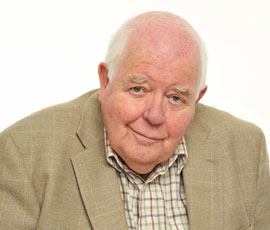OPINION: Competition is fine – as long as it’s fair, says David Richardson

Competitiveness. The watchword of politicians, farmers leaders and thrusting entrepreneurs alike.
It implies self-confidence, possibly arrogance, by the person or group subscribing to the concept in believing they are better than others with whom they compete. My travels around the world have persuaded me that, in many cases, such certainty is not justified.
The word our self-styled high-flyers never want to be associated with is “protectionism”. That implies weakness and reliance on others – not the kind of concession they would admit to needing. Our self-reliant colleagues have faith they can rise above minor inconveniences and come out on top, whatever the opposition. Experience has sometimes shown the higher they get, the harder they fall.
So, let’s examine some of the evidence for the cult of competitiveness. Firstly, what it has delivered in recent years for the nation’s food security, one measure of which is the level of self-sufficiency.
Back in the mid 1990s, the UK’s food trade gap – that is the annual deficit in value between the amount of food imported and that exported – hovered around £6bn. By 2005 it had more than doubled to £12.5bn and last year it reached £22bn. In other words, it is accelerating when logic, a UK population rising towards 70 million, world population statistics and increasing demand for food would suggest it should be heading in the opposite direction.
But while preaching competitiveness, politicians both here in the UK and Europe have imposed rules to inhibit it. Basing their policies partly on yesterday’s agenda when food surpluses ruled, and partly on the dictates of the Green tendency whose votes they seek to attract, they have taken more land out of production than was ever justified for conservation. They have limited the use of yield-enhancing nitrogen on largely spurious grounds and reduced the number of agrochemicals that can be used on land – many for political rather than scientific reasons. And they continue to ban the use of GMs, despite their increasingly widespread and harmless use in many countries around the world.
Livestock farming has fared no better. Last year the national pig herd, which is famously unprotected, fell, again, by 2.4% to 4.2 million, the smallest national herd since 1952. Moreover pig numbers have been declining since the UK, unilaterally in Europe, imposed a ban on sow stalls before the turn of the century. Half the national herd has disappeared since then, as many pig farmers struggled but failed to compete against imports more cheaply produced in conditions illegal here. And even now, when all EU pig farmers were supposed to have thrown out their stalls, illegally produced pigmeat is still being imported. Shouldn’t UK pig farmers be protected against such practices?
The national sheep flock has reduced over the last 10 years from 20 million head to 12 million. Some of this has been caused by the slump in demand for wool, some by restrictions on grazing and reduced aid for hill farmers. It can all be summarised as lack of profitability for flock owners. And the inadequate prices paid for milk for the last few years have resulted in a reduced national cow herd, failure to produce up to quota and more imports from other EU countries.
I could go on. But I have said enough to illustrate what competition has achieved and the damage lack of protection from unfair competition can do. Not just to farmers but to the nation, as it almost certainly has to prepare for food shortages in the not-too-distant future.
David Richardson farms about 400ha (1,000 acres) of arable land near Norwich in Norfolk in partnership with his wife, Lorna. His son, Rob, is farm manager.
